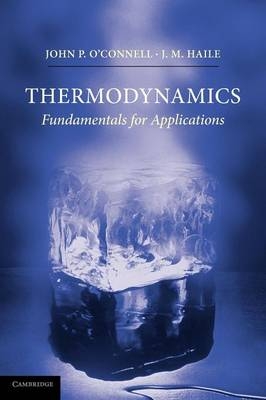
Thermodynamics
Cambridge University Press (Verlag)
978-0-521-58206-3 (ISBN)
Thermodynamics: Fundamentals and Applications is a 2005 text for a first graduate course in Chemical Engineering. The focus is on macroscopic thermodynamics; discussions of modeling and molecular situations are integrated throughout. Underpinning this text is the knowledge that while thermodynamics describes natural phenomena, those descriptions are the products of creative, systematic minds. Nature unfolds without reference to human concepts of energy, entropy, or fugacity. Natural complexity can be organized and studied by thermodynamics methodology. The power of thermodynamics can be used to advantage if the fundamentals are understood. This text's emphasis is on fundamentals rather than modeling. Knowledge of the basics will enhance the ability to combine them with models when applying thermodynamics to practical situations. While the goal of an engineering education is to teach effective problem solving, this text never forgets the delight of discovery, the satisfaction of grasping intricate concepts, and the stimulation of the scholarly atmosphere.
John P. O'Connell is a Professor of Chemical Engineering at the University of Virginia. He has over 30 years experience in teaching, research, and consulting in thermodynamics, statistical mechanics, and related areas. J. M. Haile is currently publisher, editor, writer, designer, and composer-in-residence at Macatea Productions. He has twenty-four years of university teaching experience in thermodynamics, statistical mechanics, numerical methods and technical communications. He has held visiting research positions at the US Military Academy (West Point, NY), University of Guelph (Ontario), Chalk River National Labs (Ontario), Cornell University, Ruhr University (Bochum, Germany) and Colorado School of Mines. He is a recipient of a Presidential Young Investigator Award from the National Science Foundation (1984) and the Corcoran Award (1998) from the Chemical Engineering Division of the American Society for Engineering Education. He is the former North American editor of the international journal Molecular Simulation, published by Gordon and Breach, London, and is the author of Molecular Dynamics Simulation (Wiley), Lectures in Thermodynamics (Macatea), Technical Style (Macatea), Analysis of Data (Macatea), and The Way of the Teacher (Macatea). He holds a BS in Chemical Engineering from Vanderbilt University and a PhD in Chemical Engineering from the University of Florida.
Introduction; Part I. The Basics: 1. Primitives; 2. The first and second laws; 3. Fundamental relations; Part II. Single-Phase Systems: 4. Properties relative to ideal gases; 5. Properties relative to ideal solutions; 6. Relations among relations; Part III. Multiphase and Reacting Systems: 7. Transfers, transformations, and equilibria; 8. Criteria for observability; 9. Phase diagrams for real systems; Part IV. Engineering Calculations: 10. Options for equilibrium calculations; 11. Elementary computational procedures; 12. Selected applications; Afterword; Appendices: A. Tools from the calculus; B. Elements of linear algebra; C. Solutions to cubic equations; D. Vapor pressures of selected fluids; E. Model parameters for G excess; F. A stability condition for binaries; G. Notation in variational calculus; H. Triangular diagrams; I. Lagrange multipliers; J. NRTL models; K. Simple algorithms for binary VLLE; Notation; Index.
| Erscheint lt. Verlag | 16.5.2005 |
|---|---|
| Verlagsort | Cambridge |
| Sprache | englisch |
| Maße | 183 x 262 mm |
| Gewicht | 1305 g |
| Themenwelt | Naturwissenschaften ► Physik / Astronomie ► Thermodynamik |
| Technik ► Maschinenbau | |
| ISBN-10 | 0-521-58206-7 / 0521582067 |
| ISBN-13 | 978-0-521-58206-3 / 9780521582063 |
| Zustand | Neuware |
| Haben Sie eine Frage zum Produkt? |
aus dem Bereich


